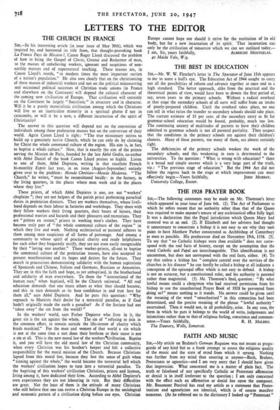THE 1928 PRAYER BOOK
SIR,—The following comments may be made on Mr. Thomson's letter which appeared in your issue of June 6th. (1). The Act of Parliament to which he refers meant that no authority other than that of the Queen was required to make anyone's tenure of any ecclesiastical office fully legal. It was a declaration that the Papal jurisdiction which Queen Mary had restored was at an end. (2). If Elizabeth and her advisers had thought it unnecessary to consecrate a bishop it is not easy to see why they took pains to have Matthew Parker consecrated as Archbishop of Canterbury as soon as possible. His predecessor died on November 19th, 1558. (3). To say that "no Catholic bishops were then available " does not corre- spond with the real facts of history, except on the assumption that the word Catholic and Papal are interchangeable. This identification is not uncommon, but does not correspond with the real facts, either. (4). To say that unless a bishop has " complete control over the services of the churches in his diocese " he can hardly be called a bishop at all indicates a conception of the episcopal office which is not easy to defend. A bishop is not an autocrat, but a constitutional ruler, and his authority is paternal rather than magisterial. (5). Mr. Thomson's final, question: " By what lawful means could a clergyman who had received permission from his bishop to use the unauthorised Prayer Book of 1928 be prevented from doing so?"_means nothing as it stands. No answer could be given until the meaning of the word " unauthorised " in this connection had been determined, and the precise meaning of the phrase " lawful authority " ascertained. Then it would not, in all probability, arise. In any case, the form in which he puts it belongs to the world of writs, judgements and injunctions rather than to that of religious feeling, conscience and common-


































 Previous page
Previous page